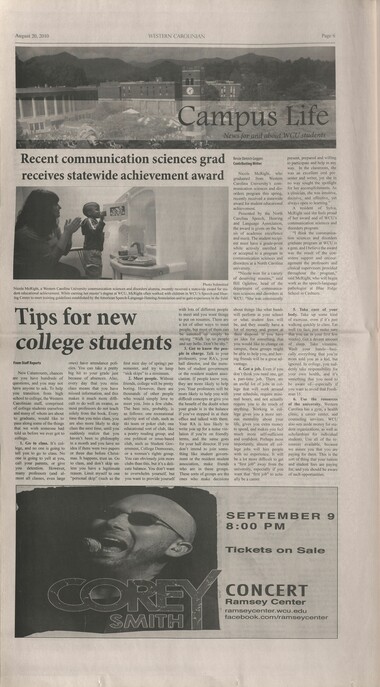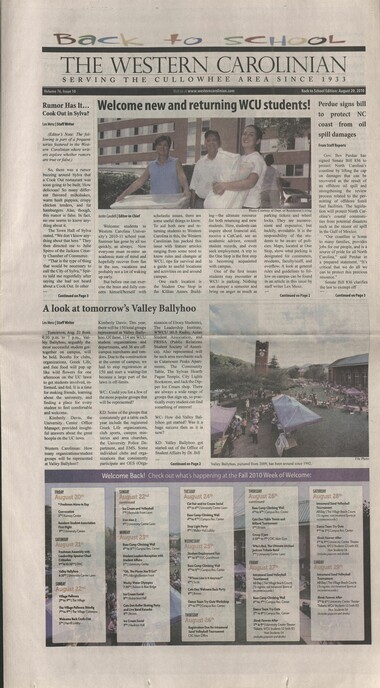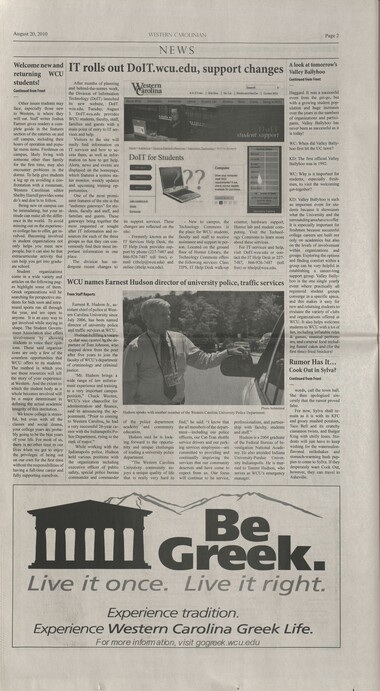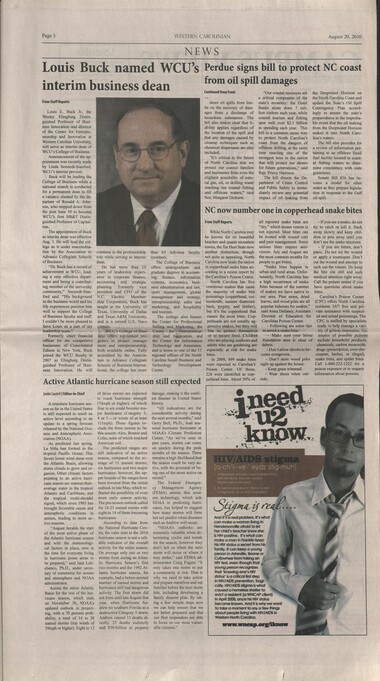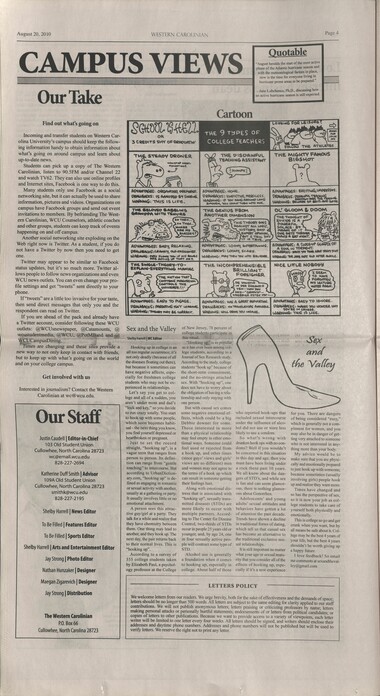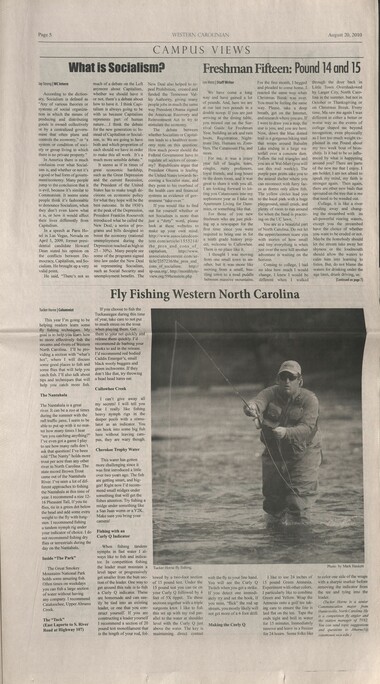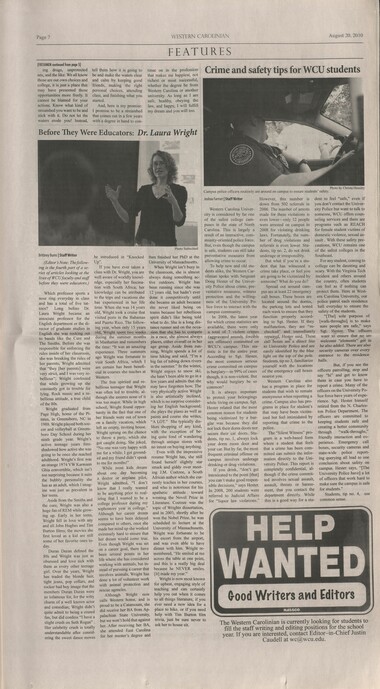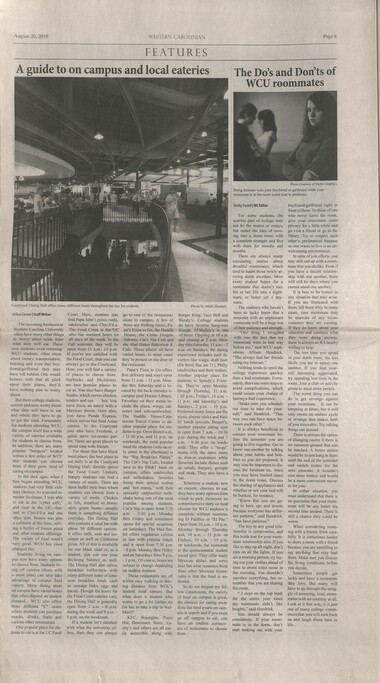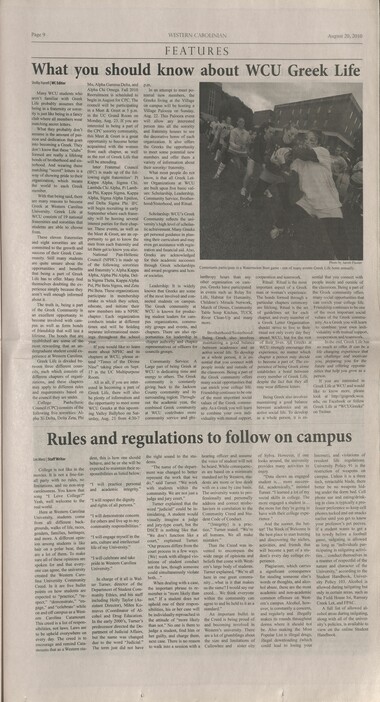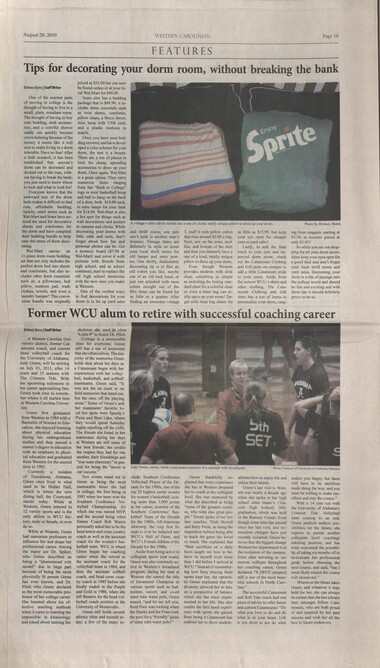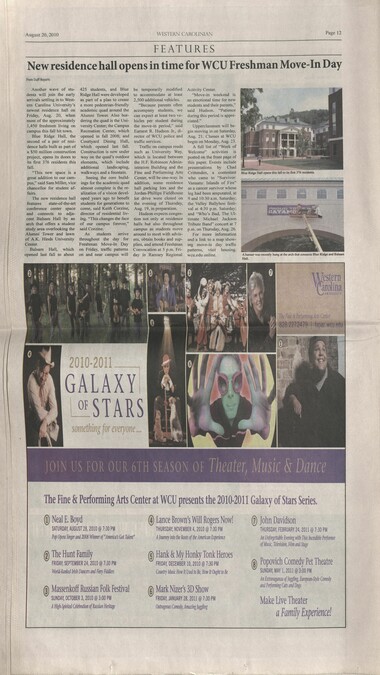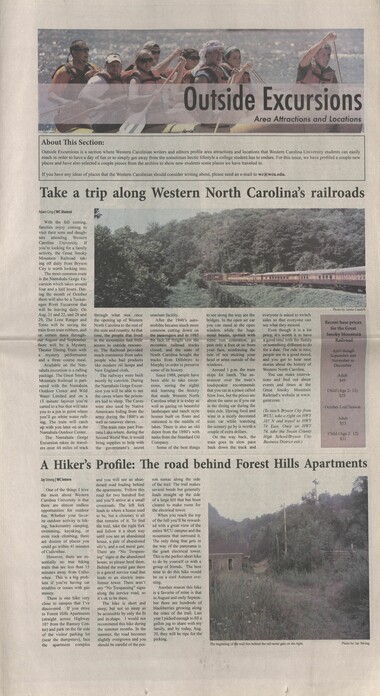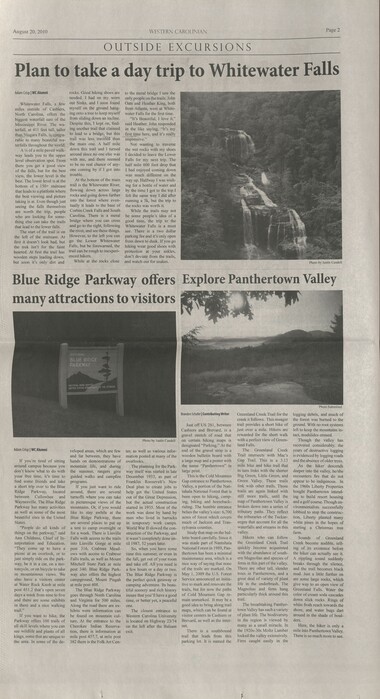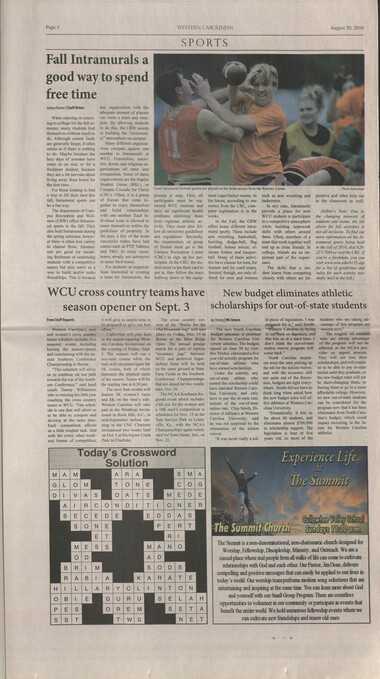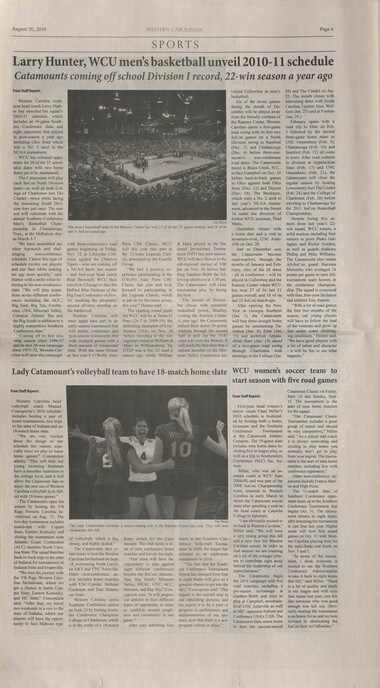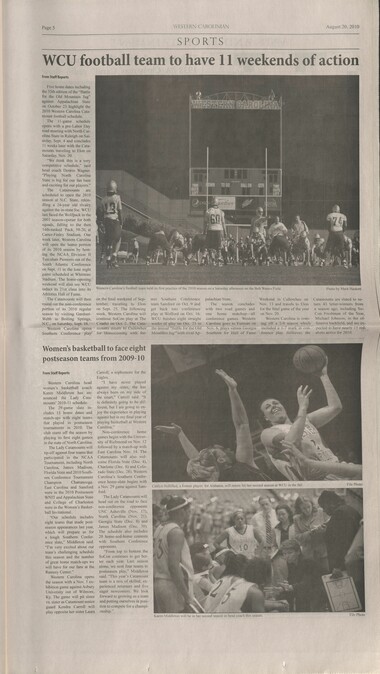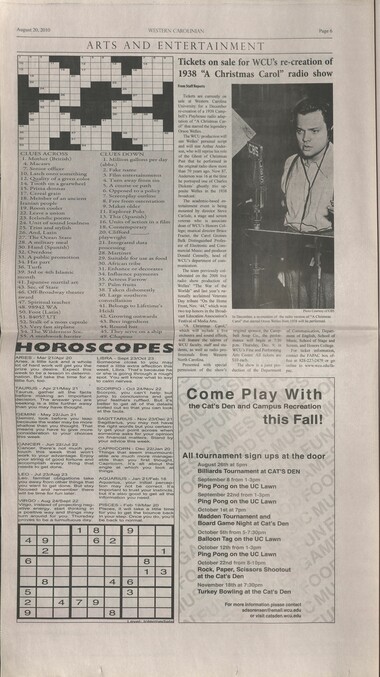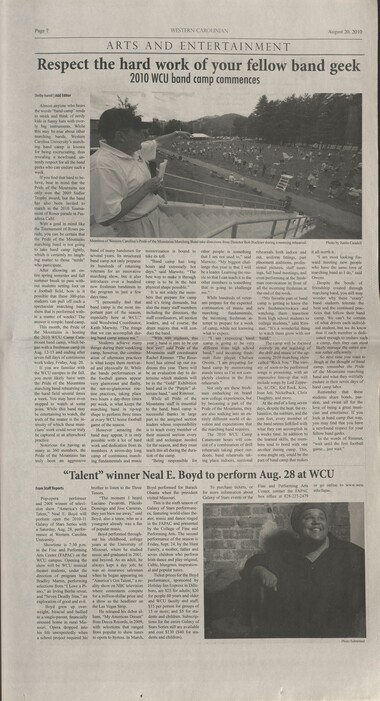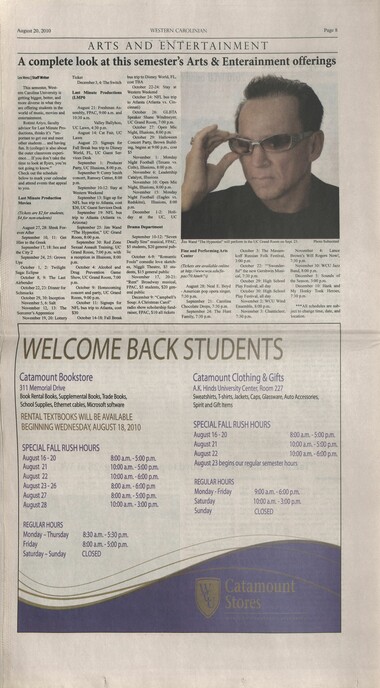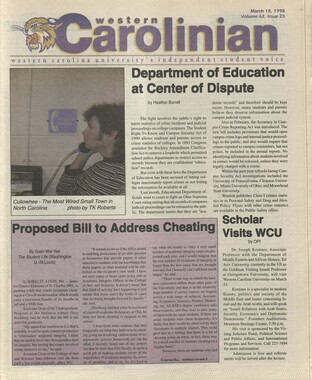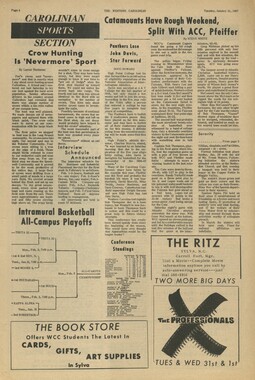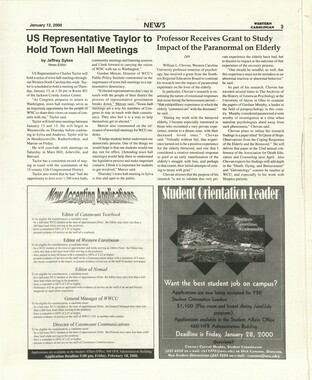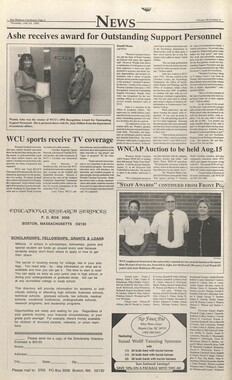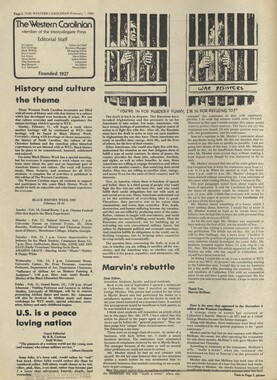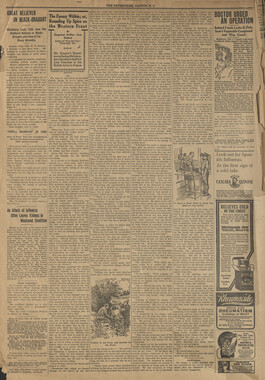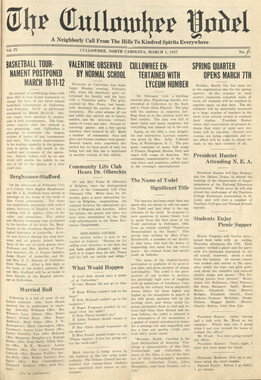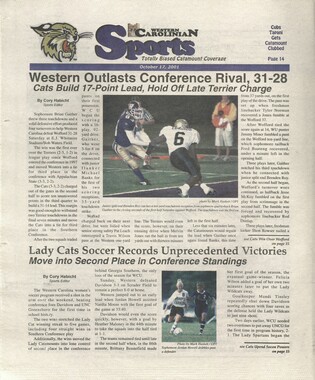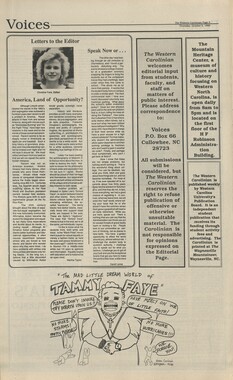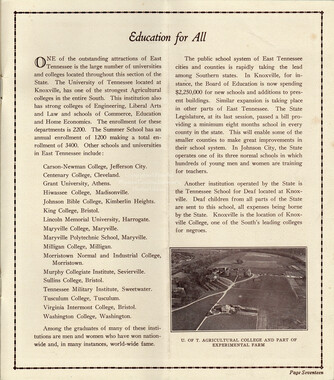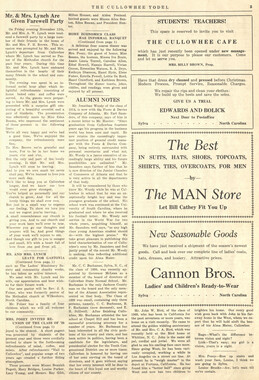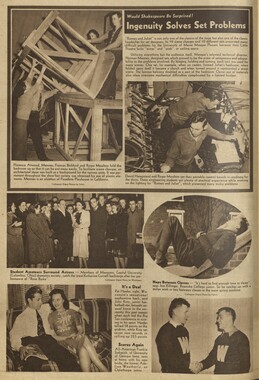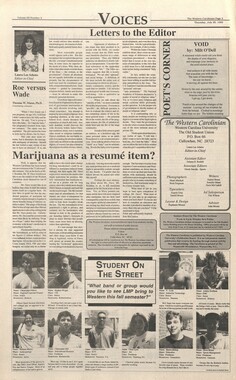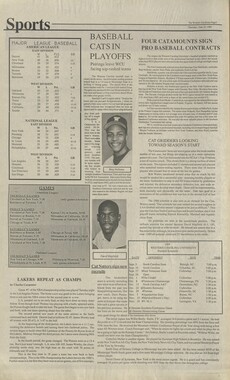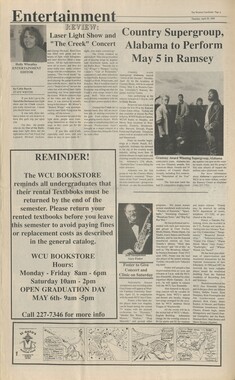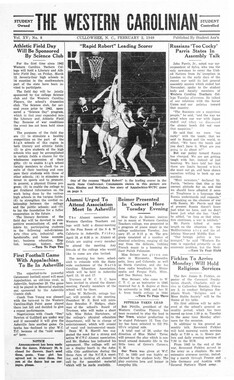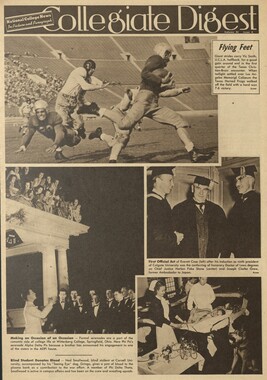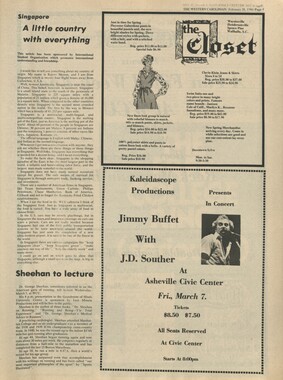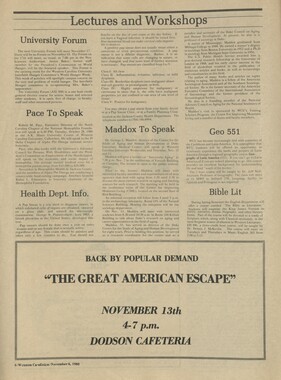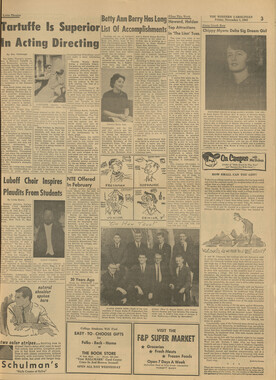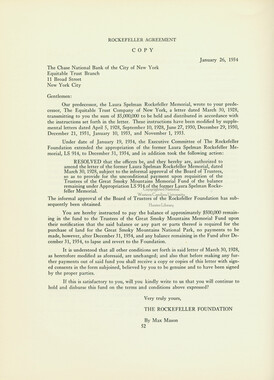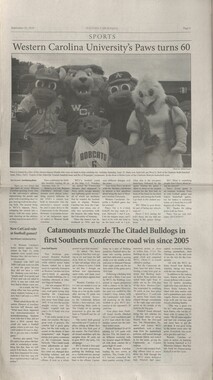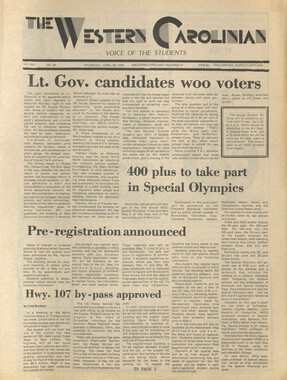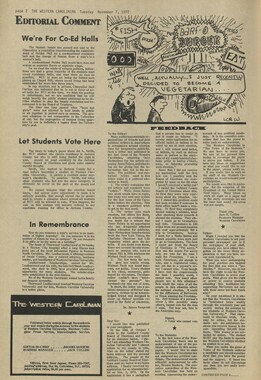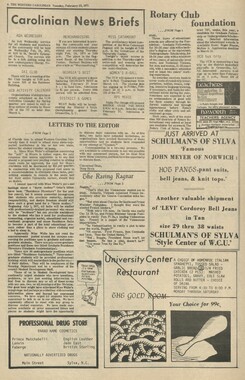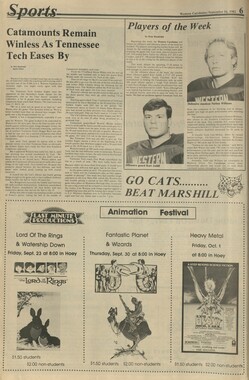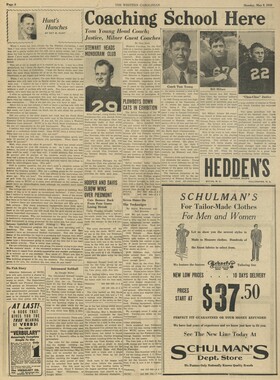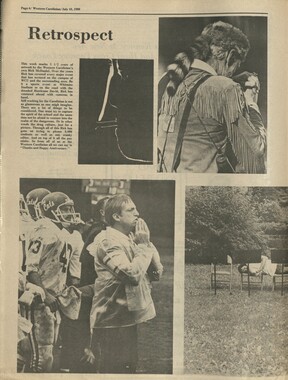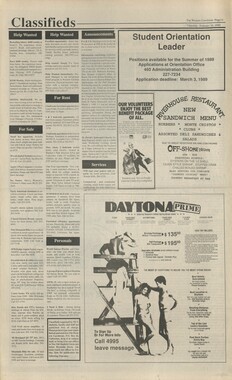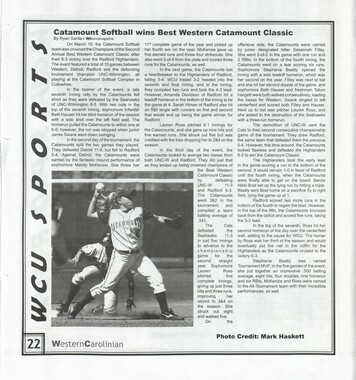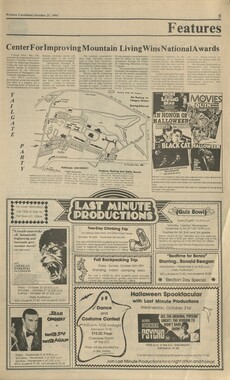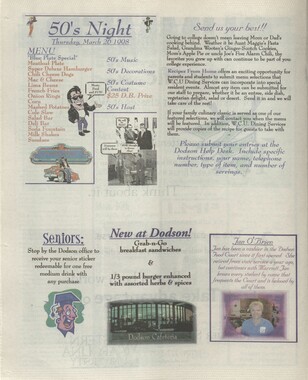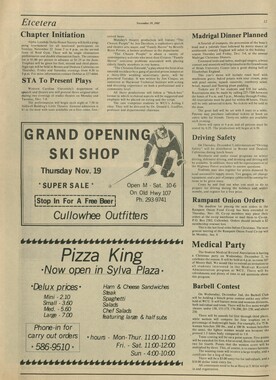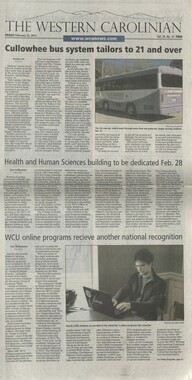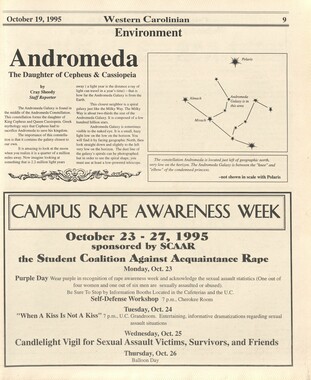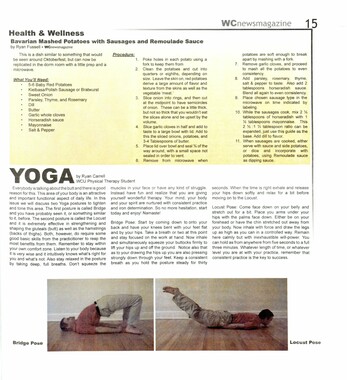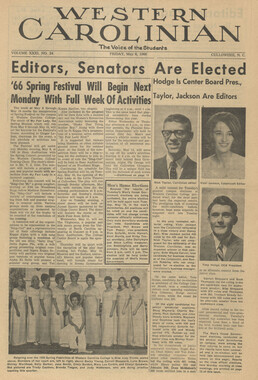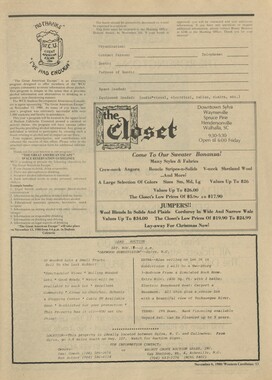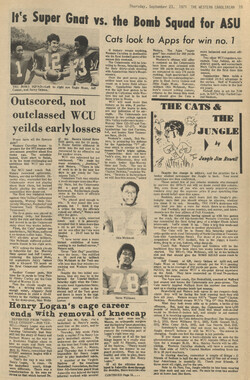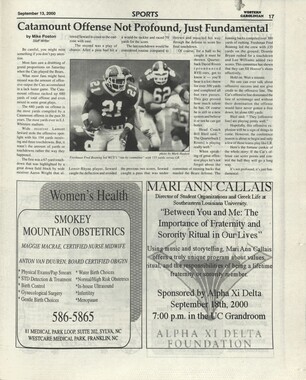Western Carolina University (21)
View all
- Canton Champion Fibre Company (2308)
- Cherokee Traditions (291)
- Civil War in Southern Appalachia (165)
- Craft Revival (1942)
- George Masa Collection (137)
- Great Smoky Mountains - A Park for America (2900)
- Highlights from Western Carolina University (422)
- Horace Kephart (973)
- Journeys Through Jackson (159)
- LGBTQIA+ Archive of Jackson County (85)
- Oral Histories of Western North Carolina (316)
- Picturing Appalachia (6797)
- Stories of Mountain Folk (413)
- Travel Western North Carolina (153)
- Western Carolina University Fine Art Museum Vitreograph Collection (129)
- Western Carolina University Herbarium (92)
- Western Carolina University: Making Memories (738)
- Western Carolina University Publications (2491)
- Western Carolina University Restricted Electronic Theses and Dissertations (146)
- Western North Carolina Regional Maps (71)
- World War II in Southern Appalachia (131)
University of North Carolina Asheville (6)
View all
- Allanstand Cottage Industries (62)
- Appalachian National Park Association (53)
- Bennett, Kelly, 1890-1974 (1463)
- Berry, Walter (76)
- Brasstown Carvers (40)
- Carver, George Washington, 1864?-1943 (26)
- Cathey, Joseph, 1803-1874 (1)
- Champion Fibre Company (233)
- Champion Paper and Fibre Company (297)
- Cherokee Indian Fair Association (16)
- Cherokee Language Program (22)
- Crowe, Amanda (40)
- Edmonston, Thomas Benton, 1842-1907 (7)
- Ensley, A. L. (Abraham Lincoln), 1865-1948 (275)
- Fromer, Irving Rhodes, 1913-1994 (70)
- George Butz (BFS 1907) (46)
- Goodrich, Frances Louisa (120)
- Grant, George Alexander, 1891-1964 (96)
- Heard, Marian Gladys (60)
- Kephart, Calvin, 1883-1969 (15)
- Kephart, Horace, 1862-1931 (313)
- Kephart, Laura, 1862-1954 (67)
- Laney, Gideon Thomas, 1889-1976 (439)
- Masa, George, 1881-1933 (61)
- McElhinney, William Julian, 1896-1953 (44)
- Niggli, Josephina, 1910-1983 (10)
- North Carolina Park Commission (105)
- Osborne, Kezia Stradley (9)
- Owens, Samuel Robert, 1918-1995 (11)
- Penland Weavers and Potters (36)
- Roberts, Vivienne (15)
- Roth, Albert, 1890-1974 (142)
- Schenck, Carl Alwin, 1868-1955 (1)
- Sherrill's Photography Studio (2565)
- Southern Highland Handicraft Guild (127)
- Southern Highlanders, Inc. (71)
- Stalcup, Jesse Bryson (46)
- Stearns, I. K. (213)
- Thompson, James Edward, 1880-1976 (226)
- United States. Indian Arts and Crafts Board (130)
- USFS (683)
- Vance, Zebulon Baird, 1830-1894 (1)
- Weaver, Zebulon, 1872-1948 (58)
- Western Carolina College (230)
- Western Carolina Teachers College (282)
- Western Carolina University (2008)
- Western Carolina University. Mountain Heritage Center (18)
- Whitman, Walt, 1819-1892 (10)
- Wilburn, Hiram Coleman, 1880-1967 (73)
- Williams, Isadora (3)
- Cain, Doreyl Ammons (0)
- Crittenden, Lorraine (0)
- Rhodes, Judy (0)
- Smith, Edward Clark (0)
- Appalachian Region, Southern (2940)
- Asheville (N.C.) (1944)
- Avery County (N.C.) (26)
- Blount County (Tenn.) (195)
- Buncombe County (N.C.) (1680)
- Cherokee County (N.C.) (283)
- Clay County (N.C.) (556)
- Graham County (N.C.) (238)
- Great Smoky Mountains National Park (N.C. and Tenn.) (525)
- Haywood County (N.C.) (3573)
- Henderson County (N.C.) (70)
- Jackson County (N.C.) (4919)
- Knox County (Tenn.) (35)
- Knoxville (Tenn.) (13)
- Lake Santeetlah (N.C.) (10)
- Macon County (N.C.) (421)
- Madison County (N.C.) (216)
- McDowell County (N.C.) (39)
- Mitchell County (N.C.) (135)
- Polk County (N.C.) (35)
- Qualla Boundary (982)
- Rutherford County (N.C.) (78)
- Swain County (N.C.) (2185)
- Transylvania County (N.C.) (270)
- Watauga County (N.C.) (12)
- Waynesville (N.C.) (86)
- Yancey County (N.C.) (72)
- Aerial Photographs (3)
- Aerial Views (60)
- Albums (books) (4)
- Articles (1)
- Artifacts (object Genre) (228)
- Bibliographies (1)
- Biography (general Genre) (2)
- Cards (information Artifacts) (38)
- Clippings (information Artifacts) (192)
- Copybooks (instructional Materials) (3)
- Crafts (art Genres) (622)
- Depictions (visual Works) (21)
- Design Drawings (1)
- Digital Moving Image Formats (2)
- Drawings (visual Works) (185)
- Envelopes (101)
- Exhibitions (events) (1)
- Facsimiles (reproductions) (1)
- Fiction (general Genre) (4)
- Financial Records (12)
- Fliers (printed Matter) (67)
- Glass Plate Negatives (381)
- Guidebooks (2)
- Internegatives (10)
- Interviews (817)
- Land Surveys (102)
- Letters (correspondence) (1045)
- Manuscripts (documents) (618)
- Maps (documents) (177)
- Memorandums (25)
- Minutes (administrative Records) (59)
- Negatives (photographs) (6090)
- Newsletters (1290)
- Newspapers (2)
- Notebooks (8)
- Occupation Currency (1)
- Paintings (visual Works) (1)
- Pen And Ink Drawings (1)
- Periodicals (193)
- Personal Narratives (10)
- Photographs (12976)
- Plans (maps) (1)
- Poetry (6)
- Portraits (4568)
- Postcards (329)
- Programs (documents) (181)
- Publications (documents) (2444)
- Questionnaires (65)
- Relief Prints (26)
- Sayings (literary Genre) (1)
- Scrapbooks (282)
- Sheet Music (2)
- Slides (photographs) (402)
- Songs (musical Compositions) (2)
- Sound Recordings (796)
- Specimens (92)
- Speeches (documents) (18)
- Tintypes (photographs) (8)
- Transcripts (324)
- Text Messages (0)
- A.L. Ensley Collection (275)
- Appalachian Industrial School Records (7)
- Appalachian National Park Association Records (336)
- Axley-Meroney Collection (2)
- Bayard Wootten Photograph Collection (20)
- Bethel Rural Community Organization Collection (7)
- Blumer Collection (5)
- C.W. Slagle Collection (20)
- Canton Area Historical Museum (2110)
- Carlos C. Campbell Collection (462)
- Cataloochee History Project (64)
- Cherokee Studies Collection (4)
- Daisy Dame Photograph Album (5)
- Daniel Boone VI Collection (1)
- Doris Ulmann Photograph Collection (112)
- Elizabeth H. Lasley Collection (1)
- Elizabeth Woolworth Szold Fleharty Collection (4)
- Frank Fry Collection (95)
- George Masa Collection (173)
- Gideon Laney Collection (452)
- Hazel Scarborough Collection (2)
- Hiram C. Wilburn Papers (28)
- Historic Photographs Collection (236)
- Horace Kephart Collection (861)
- Humbard Collection (33)
- Hunter and Weaver Families Collection (1)
- I. D. Blumenthal Collection (4)
- Isadora Williams Collection (4)
- Jesse Bryson Stalcup Collection (47)
- Jim Thompson Collection (224)
- John B. Battle Collection (7)
- John C. Campbell Folk School Records (80)
- John Parris Collection (6)
- Judaculla Rock project (2)
- Kelly Bennett Collection (1482)
- Love Family Papers (11)
- Major Wiley Parris Civil War Letters (3)
- Map Collection (12)
- McFee-Misemer Civil War Letters (34)
- Mountain Heritage Center Collection (4)
- Norburn - Robertson - Thomson Families Collection (44)
- Pauline Hood Collection (7)
- Pre-Guild Collection (2)
- Qualla Arts and Crafts Mutual Collection (12)
- R.A. Romanes Collection (681)
- Rosser H. Taylor Collection (1)
- Samuel Robert Owens Collection (94)
- Sara Madison Collection (144)
- Sherrill Studio Photo Collection (2558)
- Smoky Mountains Hiking Club Collection (616)
- Stories of Mountain Folk - Radio Programs (374)
- The Reporter, Western Carolina University (510)
- Venoy and Elizabeth Reed Collection (16)
- WCU Gender and Sexuality Oral History Project (32)
- WCU Mountain Heritage Center Oral Histories (25)
- WCU Oral History Collection - Mountain People, Mountain Lives (71)
- WCU Students Newspapers Collection (1923)
- Western North Carolina Tomorrow Black Oral History Project (69)
- William Williams Stringfield Collection (2)
- Zebulon Weaver Collection (109)
- African Americans (390)
- Appalachian Trail (35)
- Artisans (521)
- Cherokee art (84)
- Cherokee artists -- North Carolina (10)
- Cherokee language (21)
- Cherokee pottery (101)
- Cherokee women (208)
- Church buildings (190)
- Civilian Conservation Corps (U.S.) (111)
- College student newspapers and periodicals (2012)
- Dams (108)
- Dance (1023)
- Education (222)
- Floods (63)
- Folk music (1015)
- Forced removal, 1813-1903 (2)
- Forest conservation (220)
- Forests and forestry (1197)
- Gender nonconformity (4)
- Great Smoky Mountains National Park (N.C. and Tenn.) (181)
- Hunting (46)
- Landscape photography (25)
- Logging (119)
- Maps (83)
- Mines and mineral resources (9)
- North Carolina -- Maps (18)
- Paper industry (38)
- Postcards (255)
- Pottery (135)
- Railroad trains (72)
- Rural electrification -- North Carolina, Western (3)
- School integration -- Southern States (2)
- Segregation -- North Carolina, Western (5)
- Slavery (5)
- Sports (452)
- Storytelling (243)
- Waterfalls -- Great Smoky Mountains (N.C. and Tenn.) (66)
- Weaving -- Appalachian Region, Southern (280)
- Wood-carving -- Appalachian Region, Southern (328)
- World War, 1939-1945 (173)
Western Carolinian Volume 76 Number 10
Item
Item’s are ‘child’ level descriptions to ‘parent’ objects, (e.g. one page of a whole book).
-
-
August 20, 2010 WESTERN CAROLINIAN Recent communication sciences grad receives statewide achievement award Photo Submitted Nicole McRight, a Western Carolina University communication sciences and disorders alumna, recently received a statewide award for stu- dent educational achievement. While earning her masters degree at WCU, McRight often worked with children in WCUs Speech and Hear- econ Center to meet ee se established by the American Speech-Language-Hearing Association and to gain experience in the field. _ Tips for new From Staff Reports New Catamounts, chances are you have hundreds of questions, and you may not have anyone to ask. To help you transition from high school to college, the Western Carolinian staff, comprised of college students ourselves and many of whom are about to graduate, would like to pass along some of the things that we wish someone had told us before we ever got to college. 1. Go to class. Its col- lege, and no one is going to tell you to go to class. No one is going to yell at you, call your parents, or give you detention. However, many professors (and al- most all classes, even large ones) have attendance poli- cies. You can take a pretty big hit to your grade just because of absences. Also, every day that you miss class means that you have missed information, and this makes it much more diffi- cult to do well on exams, as most professors do not teach solely from the book. Every time that you miss class, you are also more likely to skip class the next time, until you suddenly realize that you havent been to philosophy in a month and you have no idea if there were two papers or three due before Christ- mas. It happens, trust us. Go to class, and dont skip un- less you have a legitimate reason. Limit myself to one personal skip (such as the ollege students first nice day of spring) per semester, and try to keep sick skips to a minimum. 2. Meet people. Without friends, college will be pretty boring. However, there are thousands of other people who would simply love to meet you. Join a few clubs, The best mix, probably, is as follows: one recreational activity sort of club, such as ski team or poker club; one educational sort of club, like a poetry reading group; and one political or issue-based club, such as Student Gov- ernment, College Democrats, or a womens rights group. You can obviously join more clubs than this, but its a deli- cate balance. You dont want to overwhelm yourself, but you want to provide yourself with lots of different people to meet and you want things fo put on resumes. There are a lot of other ways to meet people, but Most of them can be summed. up simply by saying Walk up to people and say hello. Dont be shy. 3. Get to know the peo- ple in charge. Talk to your professors, your RAs, your hall director, and the mem- bers of student government or the resident student asso- ciation. [f people know you, they are more likely to help you. Your professors will be more likely to help you with difficult concepts or give you the benefit of the doubt when your grade is in the balance if youve stopped in at their office and talked with them. Your RA is less likely to write you up for a noise vio- lation if youre on friendly terms, and the same goes for your hall director. If you dont intend to join some- thing like student govern- ment or the resident student association, make friends who are in these groups. These sorts of groups are the ones who make decisions Bessie Dietrich Goggins Contributing Writer Nicole McRight, who graduated from Western Carolina Universitys com- munication sciences and dis- orders program this spring, recently received a statewide award for student educational achievement. Presented by the North Carolina Speech, Hearing and Language Association, the award is given on the ba- sis of academic excellence and merit. The student recipi- ent must have a grade-point while actively enrolled in or accepted to a program in communication sciences and disorders at a North Carolina university. Nicole won for a variety of deserving reasons, said Bill Ogletree, head of the department of communica- tion sciences and disorders at about things like what bands will perform at your school or what student fees will be, and they usually have a lot of money and. power, at their disposal. If you have an idea for something, that you would like to change on campus, these groups might be able to help you, and hav- ing friends will be a great ad- vantage. 4. Get a job. Even if you dont think you need one, get a part-time job. There are an awful lot of jobs in col- lege that will work around your schedule, require mini- mal hours, and not actually require you to do much of anything. Working in. col- lege gives you a more seri- ous mentality about your life, gives you extra money to spend, and makes you feel much more self-sufficient and confident. Perhaps most importantly, almost all col- lege jobs will hire people with no experience. It will be a lot more difficult to get a first job away from the university, especially if you want that first job to actu- ally be a career. WCU. She was consistently Page 6 present, prepared and willing to participate and help in any way. In the classroom, she was an excellent oral pre- senter and writer, yet she in no way sought the spotlight for her accomplishments. As a clinician, she was intuitive, decisive, and effective, yet always open to learning. A resident of Sylva, McRight said she feels proud of her award and of WCUs communication sciences and disorders program. T think the communica- tion sciences and disorders graduate program at WCU is a gem, and I believe the award was the result of the con- sistent support and encour- agement the professors and clinical supervisors provided throughout the program, said McRight, who will begin work as the speech-language pathologist at Blue Ridge School in Cashiers. 5. Take care of your body. Take up some kind of exercise, even if its just walking quickly to class. Eat well (in, fact, just make sure that you eat in your first few weeks). Get a decent amount of sleep. Take vitamins. Wash your handsbasi- cally everything that youre mom told you as a kid, but ignored. In college, you sud- denly take responsibility for your own health, and its something that you need. to be aware of-especially if you want to avoid that Fresh- man 15. 6. Use the resources of the university. Western Carolina has a gym, a health clinic, a career center, and counseling services. WCU also sets aside money for stu- dent organizations, as well as scholarships for individual students. Use all of the re- sources available, because we assure you that you are paying for them. This is the sort of thing that your tuition and student fees are paying for, and you should be aware of such opportunities. ramseycenter.\ wcu.edt | facebook com/ram: = enter
Object
Object’s are ‘parent’ level descriptions to ‘children’ items, (e.g. a book with pages).
-
The Western Carolinian is Western Carolina University's student-run newspaper. The paper was published as the Cullowhee Yodel from 1924 to 1931 before changing its name to The Western Carolinian in 1933.
-
